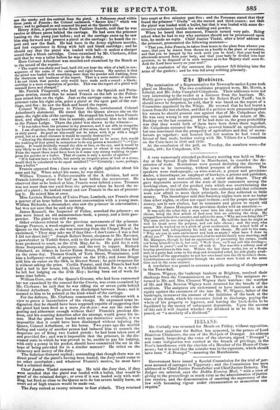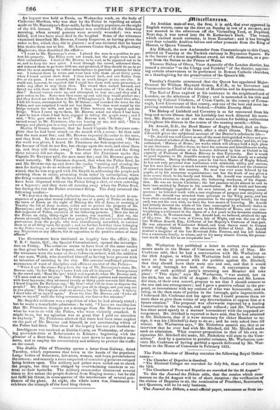IRELAND.
Mr. Corbally was returned for Meath on Friday, without opposition.
Another candidate for Belfast has appeared, in the person of Lord Hamilton Chichester, the son of the Marquis of Donegal. An address was issued, bespeaking the votes of the electors, signed " Donegal"; and some indignation was excited at the breach of privilege, in the Peer's interference with the election of a Member of the House of Com- mons ; but it is said that the mistake was in the signature, which should have been " A. Donegal "—meaning the Marchioness.
Government have issued a Special Commission for the trial of per- sons accused of outrages in Tipperary ; and the Commission has been addressed to Chief Justice Pennefather and ChiefJustice Doherty. The Judges are selected, says the Dublin Evening Mail, " with a view of giving to the proceedings as much éclat as the administration ofjustice can receive, and the demonstration of asserting the supremacy of the law with becoming vigour under circumstances so momentous can require."
An inquest was held at Ennis, on Wednesday week, on the body of Catherine Sheehan, who was shot by the Police in repelling an attack made on Mr. Bannatyne's flour-mills, by the hungry populace,on the night of the 6th instant. The disturbance was continued till the following morning, when several persons were severely wounded ; two were killed, and two have since died in the hospital. Some of the witnesses
examined described Mr. Browne, County Inspector, as having given the order to fire, which they did in platoon ; and one declared that he heard him desire them not to fire. Mr. Laurence Cruise Smyth, a Stipendiary Magistrate, thus described the affair— "Z went to Mr. Bannatyne's store. I placed the men in a position to pro- tect his property. The Police were not struck, but the people were loud in their exclamations. I desired Mr. Browne to be cool, as he appeared not to be so, and to keep the men quiet. 1 went through the crowd, addressed them, and induced them to go home with me, and promised, if they should do so, to go about the next morning to collect subscriptions to purchase potatoes for their use. 1 induced them to retire, and went back with thorn about thirty yards, when I heard several shots fired. 1 then turned bark, and saw flashes from five or six pans. I was amazed, and in as much danger as any one else. It could not, however, be expected that I could face them with arms presented, or make any effort to atop them then. The crowd then rushed forward, and forced me with them into Mill Street. I then heard cries of 'I'm shot, I'm shot !' Several women came up, and attempted to tear me; and they said I gave orders to fire. Some men then came up and said they would protect me; and they forced me with them to Dean O'Shaughnessy'a. In a short time after, I left his house, accompanied by Mr. M'Malion ; and searched the town for the Police, and was surprised I could not find them. We then went round by the bridge towards the mills, and met the Police between the hospital and the bridge. When I came up to them, Mr. Browne asked me where 1 had been. I said he knew where I had been, engaged in taking the people away ; and I said, ' Who gave orders to fire ? ' Mr. Browne said, Nobody.' I then turned round to Mr. Fitzsimon, who was leaning on me, and said, ' This is strange, and places you in a very awkward positim." Martin M Guane deposed, that he heard Captain De Ruvynes com- plain that he bad been struck on the mouth with a stone : he then said that the men must fire ; and Mr. Browne repeated the order to the men, and they fired. In the course of his evidence, M•Guane said, " Before the word was given, I. heard Mr. Fitzsimon the Sub-inspector say, 'In the honour of God do not fire, but charge upon the mob, and close them up, and they will make away.' Between these words and the firing three minutes did not elapse. It was after Mr. Fitzsimon spoke that Captain De Ruvynes said, the men must fire; and Mr. Browne gave the word instantly. Mr. Fitzsimou deposed, that when the Police fired, he and Mr. Browne ran up and down the ranks, "cursing and abusing the men for daring to do so without orders." The Reverend P. Hennessey stated, that he was engaged with Mr. Smyth in addressing the people and advising them to retire, promising them relief by subscription, when the firing commenced. He declared his conviction that the crowd might have been dispersed without the Police firing a shot, or even screwing on a bayonet; and they were all running away when the Police fired, but during the run the Police continued firing. The Jury returned the following verdict- " We find that the deceased, Catherine Sheehan, came by her death in con- sequence of a gun-shot wound inflicted by one of a party of Police on duty in the town of Eunis on the night of Monday the 6th of June, or morning of Tuesday the 7th of June instant, called out to protect the property of Mr. Bennet) in; and that that party, by the return made to us by Mr. Fitzsimon, Sub-inspector of Police, consisted of the following persons. fHere the list of the Police on duty, thirty-eight in number, was inserted.] And we, the Jurors aforesaid, further find that that party of Police did not receive sufficient provocation from the people, who were tumultuously assembled, to warrant them in at all firing upon the people ; and we further find that those belonging to the Police force, as previously named, fired not alone without orders from any Magistrate or any officers, but in opposition to the positive orders of their officers."
The Government have Instituted an inquiry into the affair ; Mr. T. B. C. Smith, Q.C., the Special Commissioner, opened the investiga- tion on Friday. The evidence seems to have been of the same nature as that given before at the inquest, only it is more fully repo, ted ; and the witnesses were the same as those before examined, with the addition of one man, Walsh, who described himself as having been present with an intention of assisting in the riot. His account confirmed previous otatements of want of discipline and efficient control of the Police-
" When I saw the stones flung from the top of Mr. Bannatyne's store, Mr. Browne said, 'In her Majesty's name I ask you all to disperse.' Some persons
in the crowd said, Read the act,' which was repeated ; when Mr. Browne said,
'1'11 soon read an act for you.' The Police left their position and marched on with fixed bayonets; they advanced twenty or thirty yards towards Mill Street. I heard Captain De Ruvynes say, My God! what will be done to disperse the people?' Mr. Browne replied, '1 will give you all in charge, and you may act as you please.' The Captain made no answer; but Mr. Browne said, '1 believe 1 must take all on myself again.' From the time Mr. Browne mid ' I take all again on myself,' until the tiring commenced, was four or live minutes."
Mr. Smyth's evidence was a repetition of what he had already stated ; but he made a remarkable admission : he said, " I have no recollection
that Mr. Fitzsimou brought me a message from Mr. Browne to know
what be was to do with the Police, who were violently attacked. It might be so, but my agitation was so great that I paid no attention
to anybody." Mr. Fitzsimon allowed that there had been some neglect on the part of Mr. Browne and himself; in not ascertaining which of the Police had fired. The close of the inquiry has not yet reached us.
...\\,1Intelligence was received at Dublin Castle, on Wednesday, of alarm- ing provision-riots at Robertstown in Kildare ; beginning with the
]under of a flour-boat. Orders were sent down to use decided mea- sures, and to employ the constabulary and military to protect the traffic on the canal.
The Dublin Pilot of Thursday quotes a letter from Galway, dated Tuesday, which represents that town in the hands of the populace. Large bodies of fishermen, labourers, women, and boys, perambulated the streets ; and scarcely a store suspected of containing potatoes escaped being broken open. The military and police were called out to check the people, but they were obliged by overwhelming numbers to re- treat to their barracks. The military commander threatened several times to fire unless the people desisted from flinging stones ; but he did not fulfil his threat, in consequence of the interterence of several gen- tlemen of the place. At night, the whole town was illuminated to celebrate the triumph of the faun bing rioters.



























 Previous page
Previous page